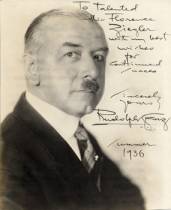
Rudolph Ganz (24 February 1877, Zürich, Switzerland – 2 August 1972, Chicago) was a Swiss pianist, conductor and composer. He claimed direct descent from Charlemagne. A pupil of Ferruccio Busoni in Berlin, Ganz became head of piano studies at the Chicago Musical College in 1901. From 1921 to 1927 he was the conductor of the St. Louis Symphony Orchestra and did much to raise it to the top rank of orchestras. While in St. Louis, he was initiated as an honorary member of Phi Mu Alpha Sinfonia music fraternity in 1924 at the University of Missouri. From 1928 he returned to teach at the Chicago Musical College, serving as its president from 1934 to 1958. Ganz was active in the promotion of new music throughout his career. In 1923 he received the Légion d'honneur of France for his introduction of the works of Claude Debussy and Maurice Ravel to American audiences, and in later years he performed and conducted pieces by Pierre Boulez, John Cage and Arthur Honegger. Ravel, in a letter to Ganz, thanked him for his performances of Ravel's work, and dedicated Scarbo the third part of his composition Gaspard de la Nuit to him in gratitude.
Eugen D'Albert Improvisator: Overture
October 31, 1923 Christian Sinding Rustle of Spring October 31, 1923
Giovanni Bolzoni
Minuet
December 5, 1925
Nikolai Rimsky-Korsakov Sadko: Song of India December 7, 1925 Edward Lassen Festival Overture, Op. 57 October 30-31,
1923
Carl Maria von Weber
Euryanthe: Overture October 29, 1923
Johann Strauss II Artist's Life
Waltzes (abridged) November 1, 1924
Edward Elgar
Pomp and Circumstance
March no. 1 (abridged) October 30,
1923 Gioachino Rossini
The Barber of Seville: Overture December 4,
1925
David German Nell Gwynn: 3
Dances December 5, 1925 Felix Mendelssohn Hebrides ("Fingal's Cave") Overture December 5,
1925
Saint Louis Symphony Orchestra
Edvard Grieg
Holberg Suite, Op.40
1920's Metropolitan Symphony Orchestra
Rudolph Ganz
| 
